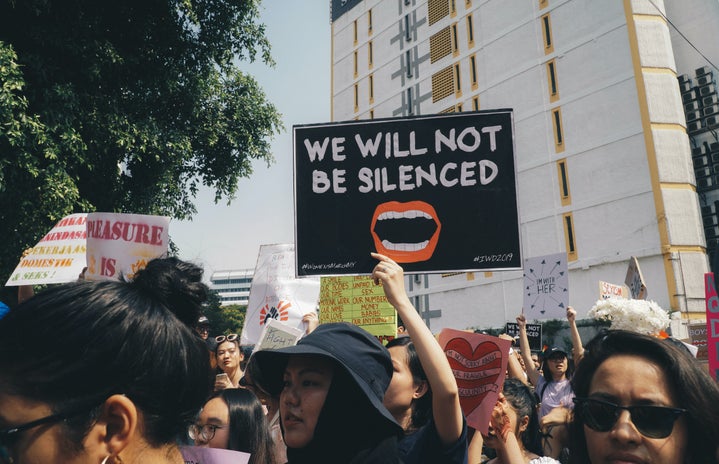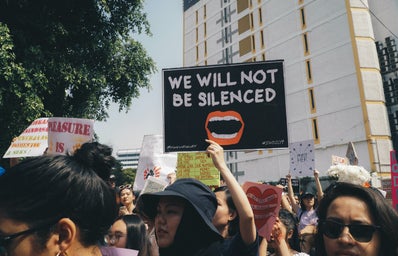Dear Reader,
I’m sure that I do not have to tell you about the events regarding abortion laws in the past few days. I can also infer that if you have clicked on this article, you likely already have decided where your opinions lie on terms of abortion rights. Established opinions aside, there are a couple things beyond the endless Instagram infographics and news articles that I think–no, I know need to be discussed in regards to the leak of the Supreme Court decision on Dobbs v Jackson Women’s Health Organization.
We’ve all heard the trigger phrases of “my body, my choice” and “right to life”, and we all understand that the overturning of Roe v Wade is, well, a terrifying event for many women. Although stress-inducing, it is in my mind absolutely essential for everyone to imagine an America where this decision is finalized. This doesn’t only mean imagining the protests and outcries that will immediately turn Capitol Hill and the Supreme Court upside down. Actually, imagine a future where Roe v Wade’s precedent is no longer a viable security blanket for women’s rights in our government.
Instead of diving into the laziness and hypocrisy of the brief that was leaked from the Republican-packed Supreme Court (you can find many opinions online already), let’s imagine this scenario on an individual level. Picture a young woman, mid-20s, who has just realized she is pregnant after having unprotected sex. Besides this one mistake, she loves reading, petting her cats, going for runs, and working with children. She’s looking forward to Harry Styles’s new album and she watches “Grey’s Anatomy” religiously. She’s four credits away from graduating and is planning a camping trip with her friends this summer. This pregnancy was preventable, yes. A person’s 20s are, according to popular culture and anyone who has experienced them, full of preventable mistakes. But, this mistake is going to be fatal for this woman.
She wants to become a teacher, and knows she cannot provide for a child while still in school. Her parents disowned her after finding out about the pregnancy, leaving her in an even more precarious financial situation. The father of the child, free from invasive law and nationwide judgment on his parenting (or pre-parenting) skills, has already left her life without any promise of financial or emotional support. So, she is left alone, in a state where abortion has been banned swiftly (which will happen in at least 26 of them) after the overturning of Roe v Wade. She does not want to have a baby. So, she decides to take a risk and have an illegal abortion (statistically, abortion levels don’t decrease when outlawed, but fatal abortions will rise by at least 21% if they are banned).
And now, reader, you’re going to find out what happened to this woman because of the “pro-life” legislation in her state–although gory, it is not discussed enough. We all know the term “botched abortion”, but not many people know what it entails. Imagine this young woman, somebody’s daughter, someone’s best friend, and a human being, is part of the 21% that the Supreme Court has condemned. A botched abortion is 58% more likely in countries with abortion outlawed, and can kill this woman in multiple ways. Imagine, after an unsafe and illegal surgical abortion, she begins to bleed out, and, out of fear of her own government, decides not to go to the hospital until it’s too late. According to accounts of a botched abortion fatality from Dr. Jen Gunter, she looks “the color of white marble”, with “a red pool between her legs”. This woman bleeds to death, away from family and friends, and in shame of wanting to live a life of her own before raising a child. She bleeds out, and loses her life, her potential, and her dreams all in a matter of five minutes.
Let’s change the scenario. Let’s say a teenage girl, after being raped and discovering she was pregnant, has no choice but to find an illegal abortion clinic to end her pregnancy. Before her assault, she loved playing basketball, swimming, and helping her baby brother learn how to read. She was raped at the first boy-girl party she’d ever been to, after getting ready by trying on her mom’s makeup and testing outfits all day with her friends. She is still a child herself and cannot raise one of her own. Let’s also say she doesn’t immediately have a dangerous level of bleeding after her botched abortion like in our first scenario. Instead, the only abortion service she could find wasn’t legally regulated to disinfect their tools before surgery (again, because no abortion is legally regulated and therefore no abortion is safe). Because of this, she is struck with septic shock. She’s in severe pain and has a high fever. She becomes confused and has difficulty breathing. Her organs begin to fail and she is alone and in pain and scared and dying. In 12 hours, she is dead.
One last scenario. Although this woman also has become pregnant unintentionally, she is beyond elated to become a mother. After working hard for years on her career to build a financial future for her family, she is finally ready to have a child. She considers herself the epitome of a modern woman, who can be successful and still raise a family. She wants to do it all. However, she is heartbroken to find out that her pregnancy is ectopic, meaning that the fetus has begun to form in the fallopian tubes instead of in the uterus. She needs to get it surgically removed. However, since the hypothetical overturning of Roe v Wade in this future, the idea to ban ectopic pregnancy abortions, first proposed in Ohio in 2019, is now law where she lives (while not addressed in Justice Alito’s decision, his argument which states that state legislatures should decide on abortion regulation make this a possibility). She remains untreated and carries an embryo destined to develop incorrectly, and eventually her fallopian tube ruptures. Yes–her fallopian tube breaks inside of her, and like in our first scenario, she bleeds out and dies. She dies in pain, heartbroken for her and a now forever imaginary future family, covered in her own blood and from a condition preventable with modern-day surgery.
Whoever is reading this article was likely expecting a legal argument from me. And, yes, I do enjoy a good debate on constitutional law, and almost all of my previous articles have followed that path. This one doesn’t need a legal opinion from me, and I’m tired of people removing the humanity from women by arguing about constitutionality and privacy rights and when a fetus develops a heartbeat. These women are people, with lives, dreams, good days, bad days, bad hair days, music preferences, favorite foods, and the right to live. So no, reader, you’re not going to get a political argument from me. Anyone who still doesn’t feel sympathy for these women doesn’t deserve the time from anyone to spell out why abortion needs to be protected. They won’t listen to a legal argument anyways.
No matter the outcome of this leaked Supreme Court decision, and no matter your opinion, dear reader, on abortion, instead of thinking about if the founding fathers intended for the Constitution to acknowledge abortion rights (which is part of Justice Alito’s argument), think about the deaths of these women. The ones I discussed are hypothetical. The ones that have, do, and will happen without access to safe and legal abortions are not. This isn’t just an imagination game–it’s real life. It happens. Please remember that.
All medical information not specifically cited is directly from an Emergency Medicine Specialist in Waukesha County, Wisconsin.


